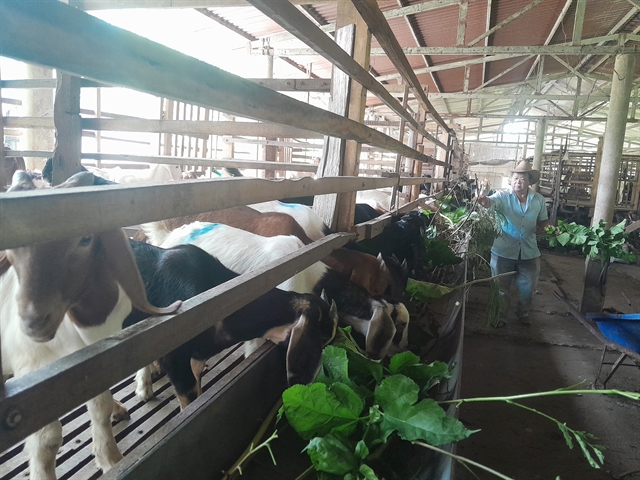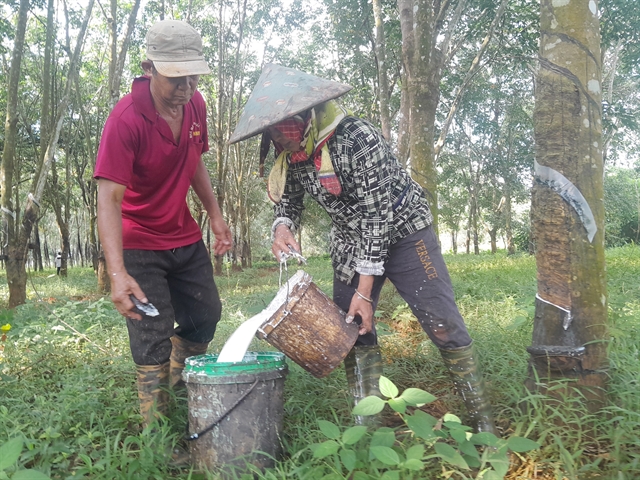 Society
Society


|
| Nông Văn Bình in Đồng Nai Province’s Tân Tiến Commune raises goats in a mixed-farming model along with silkworms besides cultivating pepper and rubber. — VNA/VNS Photo |
ĐỒNG NAI — Many ethnic households in Đồng Nai Province’s border areas have taken up mixed farming and adopted advanced techniques to secure sustainable incomes.
Nông Văn Bình, an ethnic Nùng farmer in Tân Tiến Commune, cultivates rubber, 800 pepper trellises in harvest and 600 newly planted pepper trellises on a three-hectare farm, earning hundreds of millions of đồng annually.
He said: “Agricultural prices are unstable. Many households cut or plant crops depending on market prices, but my family kept going. Instead of relying on one crop, I decided to diversify to reduce risks.”
He has also been raising livestock on his farm since 2020. After learning from friends and researching online, he tried mulberry planting and silkworm rearing. At first, he bred only two boxes of silkworms and within 17 days earned about VNĐ27 million (US$1,000) from the silk.
Besides silkworms, he raises goats for meat, selling more than 10 tonnes a year. He earns a profit of VNĐ700,000 ($26) per goat, he said.
His mixed farming model forms a closed ecosystem. He uses live trees as trellises for pepper, the branches and leaves to feed goats and goat manure to fertilise the pepper, rubber and mulberry, reducing costs and boosting productivity.
“By combining crops and livestock, I reduce input costs. As a result, expenses have dropped and income has risen steadily each year.”
This not only improves his family’s finances but also provides jobs for dozens of locals, offering them stable incomes.
He used to live in the North and moved to the former Bình Phước Province (now part of Đồng Nai) in 1990 to earn a living. After years of growing various crops, he saved enough to buy land, build a house and develop his current farm.
Điểu Thị Ánh Dương of the S’tiêng ethnic group and living in Thiện Hưng Commune developed a mixed model of rubber, rice and durian cultivation after carefully studying crops suited to local soil.
She relied not only on traditional experience but also actively learnt advanced techniques.
For rice, she focused on timing and planting methods. By following correct procedures, her family always enjoyed bumper harvests, earning VNĐ400 million ($15,240) a year.
She said: “My family searched for knowledge online and learned from experienced farmers to apply in practice. Thanks to that, we made the right decisions for our rubber and rice fields, increasing productivity.”

|
| Điểu Thị Ánh Dương in Đồng Nai Province’s Thiện Hưng Commune intercrops rubber trees, rice and durian, earning nearly VNĐ400 million a year. — VNA/VNS Photo |
In the southern province’s border areas, which are under the purview of the Agricultural Services Centre of Zone 15, six reservoirs and dams with irrigation canals supply water to more than 3,500ha of farmland.
Nguyễn Văn Bắc, its director, said a change in mindsets and farming methods among ethnic minority communities is very important.
In the past, they relied mainly on experience and traditional practices, which often led to low yields. Recently, many support policies have been introduced, including farming technique courses for ethnic households, he said.
“To further improve farming skills and economic development, the centre has carried out demonstration models prioritised for ethnic communities and held specialised training courses to help them access modern technology.”
With the support of local authorities, many households in border areas, including ethnic, have taken up mixed farming and combine high-value crops such as rubber, pepper and rice with animal husbandry.
This not only increases incomes but also hedges risks caused by market fluctuations, and their living standards have improved greatly as a result.
Bắc said ethnic farmers are gradually recognising the benefits of applying technology to boost crop and livestock productivity.
Organic and clean farming are also being promoted for long-term gains, he added. — VNS




